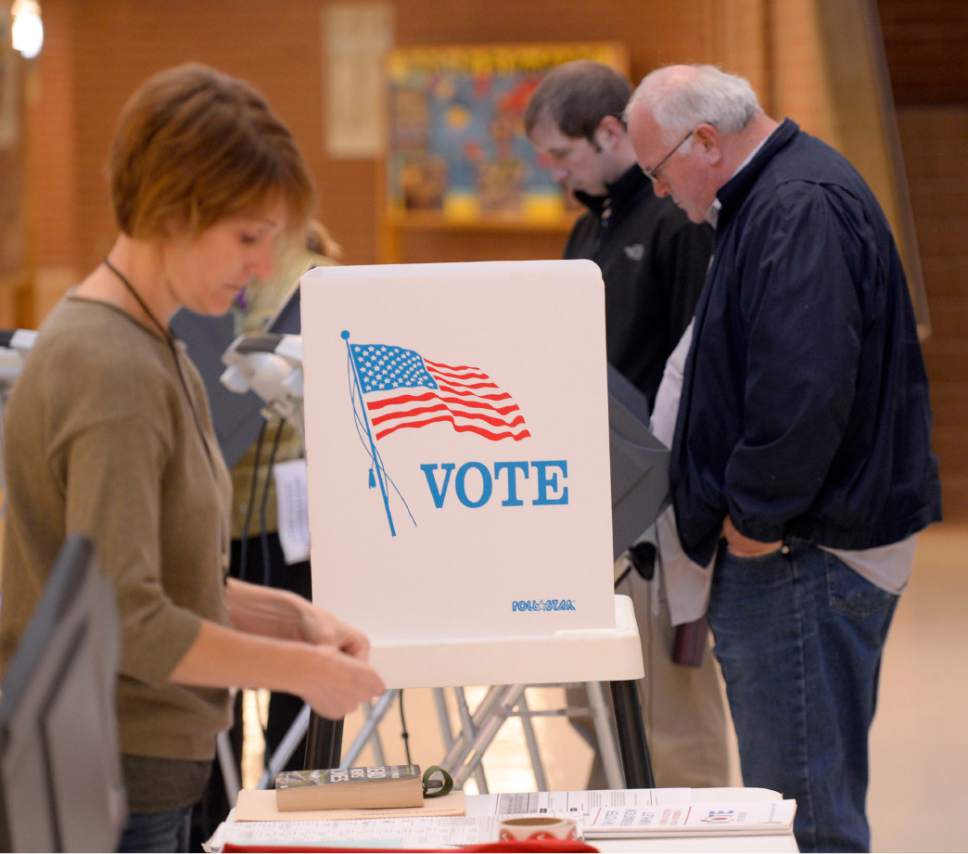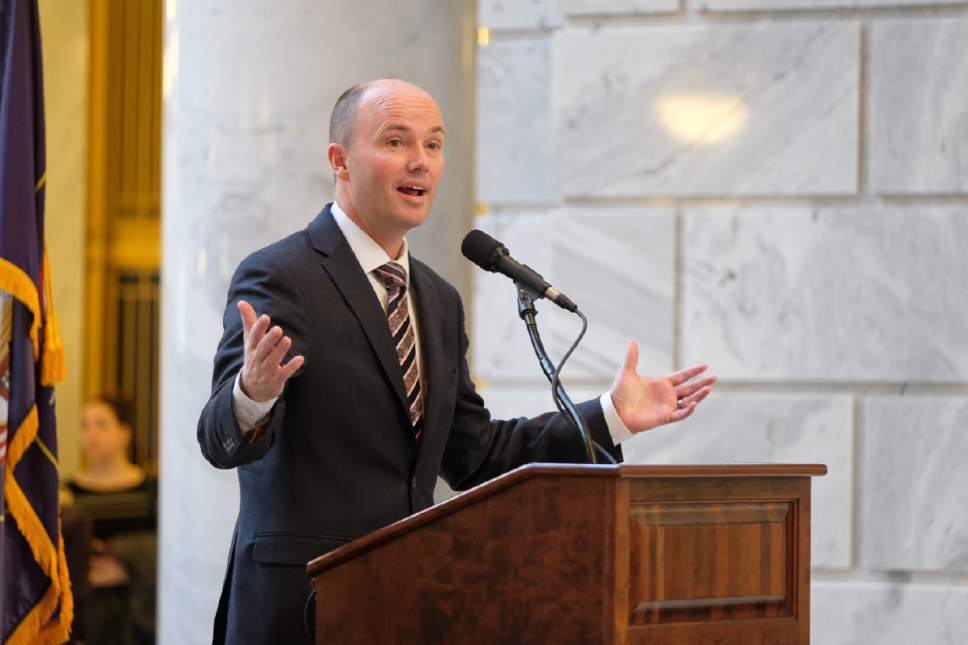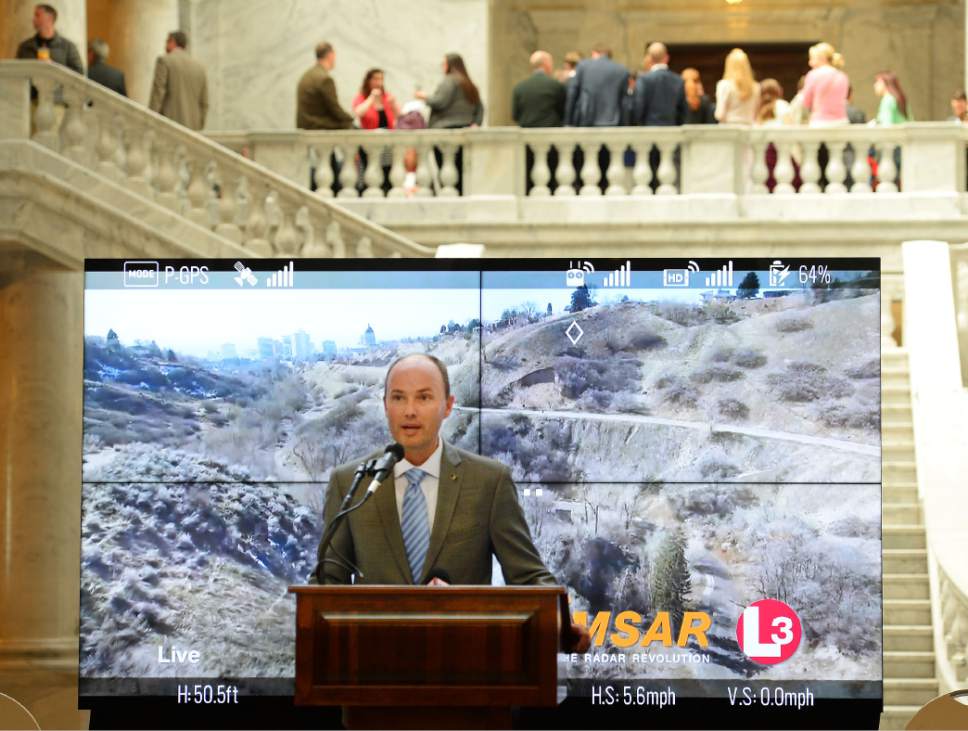This is an archived article that was published on sltrib.com in 2017, and information in the article may be outdated. It is provided only for personal research purposes and may not be reprinted.
Lt. Gov. Spencer Cox said Friday that Utah law requires him to comply with a White House commission's request for the state's public voter rolls, which is drawing fire from other election officials nationally and some civil rights groups.
But Cox insists he will protect any and all sensitive information that is not public.
The Presidential Advisory Commission on Election Integrity sent letters this week to all 50 states requesting copies of their voter rolls, including — if publicly available — the last four digits of voters' Social Security numbers, their political party, felony convictions, military status and what elections they voted in since 2006.
The panel was set up by President Donald Trump after he made unsubstantiated allegations that as many as 5 million people voted illegally last November. He tweeted then, "In addition to winning the Electoral College in a landslide, I won the popular vote if you deduct the millions of people who voted illegally."
As some attacked the request nationally, Cox issued a statement saying, "Similar to most states, Utah law requires voter registration records be public documents that can be obtained by any person or entity who submits an appropriate records request" — so he will provide them. He will not, however, turn over the last four digits of Social Security numbers, which are protected information.
"I assure the voters of Utah that we will only provide information that is otherwise available to the public," said Cox, a Republican. "The publicly available records do not include protected personal information like the voter's Social Security and driver license number."
Cox also said, "There has been no evidence of mass voter fraud in Utah and we look forward to helping the federal government understand the steps we have taken to ensure the security and validity of Utah's elections."
When Trump first aired his voter-fraud allegations in the election's wake, Cox decried his unsubstantiated assertions as "dangerous" and corrosive to public confidence in U.S. elections
Meanwhile, California Secretary of State Alex Padilla, a Democrat, said in a statement a day earlier, "I will not provide sensitive voter information to a commission that has already inaccurately passed judgment that millions of Californians voted illegally."
Padilla added, "California's participation would only serve to legitimize the false and already debunked claims of massive voter fraud made by the president, the vice president" and Kris Kobach, vice chairman of the panel who sent the letter, who is also the Kansas secretary of state and a vocal opponent of illegal immigration.
Connecticut Secretary of State Denise Merrill, a Democrat, issued a statement attacking Kobach, and questioned why he and the commission are seeking the data.
"Given Secretary Kobach's history, we find it very difficult to have confidence in the work of this commission," she said, adding that Kobach "has a lengthy record of illegally disenfranchising eligible voters in Kansas" and listed some court cases involved.
Kobach did not say in his letter exactly why the commission seeks the state's voter rolls, other than they are needed to "fully analyze vulnerabilities and issues related to voter registration and voting."
However, Kobach has advocated comparing state voter rolls with other government databases to identify noncitizens or others who cannot legally register. Civil rights groups worry such comparisons often lead to error and that legitimate voters may be removed from rolls.
Like Trump, Kobach has been quoted saying he believes a million Americans or more voted illegally in the presidential election last year.
Vanita Gupta, president and CEO of The Leadership Conference on Civil and Human Rights, tweeted that Vice President Mike "Pence and Kobach are laying the groundwork for voter suppression, plain & simple."
Karen Hobert Flynn, president of Common Cause, called the commission and its request "nothing more than a partisan attempt to manipulate our voting processes that will make it harder for eligible Americans to vote."
Utah Democratic Party Chairwoman Daisy Thomas also attacked the request for voter information.
"This request from Mr. Kobach goes too far. The demand for Social Security numbers, dates of birth, military status, political party, and voting history raises inquiries about Mr. Trump's reasons behind creating such a commission," she said.
"While he still refuses to recognize that the popular vote went to Secretary [Hillary] Clinton, his intentions in requesting this information are not only shady, but very unclear," Thomas said. "The Utah Democratic Party is committed to election integrity and transparency, but we do not support this childish task of the commission to fabricate evidence that election fraud caused the president's loss of the popular vote."
The letter from Kobach also asks state election officials for any recommendations to improve integrity of elections, and whether any laws have hindered them.
Cox said, "I look forward to learning more about the commission and how it intends to assist election officials in strengthening the integrity of the election," and added that "ensuring the integrity of the election process is the highest priority of my office."







